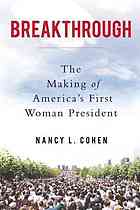
Breakthrough
The Making of America's First Woman President
- اطلاعات
- نقد و بررسی
- دیدگاه کاربران
نقد و بررسی

December 14, 2015
In this well-researched work, historian Cohen (Delirium: The Politics of Sex in America) sets out to find out why the U.S. has never elected a woman to its highest office. She interviews scores of female leaders (but not Hillary Clinton), including Susan Collins, Republican Senator from Maine; Jennifer Granholm, Democratic former governor of Michigan; Cecile Richards, the president of Planned Parenthood; and Stephanie Schriock, the president of Emilyâs List, a pro-choice political action committee. Cohen also delves into statistics and historical scholarship, ruefully noting that âone of American womenâs first major contribution to public policy was Prohibition.â Along the way, she uncovers some surprises; some recent studies find no credible evidence of gender bias in media electoral coverageââwomen and men were equally likely to have their looks and family life mentionedââand indicate that âpartisanship and ideology trump genderâ when Americans vote. Cohen covers the Republican Partyâs trouble attracting female voters, and finds that women in office are more willing to cross party lines than their male counterparts. Clintonâs 2016 run for the presidency is clearly central to Cohenâs narrative, but the book is mostly not about her, focusing instead on the many others (mainly women) who have worked to get America to the point where electing a female president seems entirely possible.

November 15, 2015
Is America ready to elect Hillary Clinton? Although women have led 50 other nations, the United States has yet to elevate a woman to the presidency. Journalist and historian Cohen (Delirium: The Politics of Sex in America, 2012, etc.), a member of the Los Angeles County Commission for Women, asks why--with surprising results. Based on interviews--quoted at length--with such women as Sen. Barbara Mikulski, EMILY's List president Stephanie Schriock, and Planned Parenthood head Cecile Richards (daughter of former Texas governor Ann Richards) and analysis of considerable scholarship, Cohen debunks some popular assumptions. She finds, for example, no evidence of "direct gender stereotyping" by the media. "Men and women," she writes, "both attract comments about their clothes, their looks, their experience, and their behavior....Most importantly, no study has ever directly linked sexist media treatment to voter attitudes." Are voters, "on some very deep level," sexist? Again, studies show otherwise: "partisan stereotypes rather than gender stereotypes shaped voters' views of candidates." Although the author argues that Americans don't consider "trustworthiness a distinctly feminine trait or intelligence a distinctly masculine one," she believes that women are more compassionate and collaborative than men and that their leadership is vastly important. While not fully persuasive that myths about a double standard "are just that--myths," Cohen does identify other problems: women assume they will be judged more harshly than men and so are reluctant to run for office. In addition, they face "structural impediments" such as a bar to new candidates and a high rate of re-election of incumbents. Rather than gender, Cohen claims, voters apply standards that are "partisan, contradictory, arbitrary, superficial, and...tangential to the job requirements." But that dispiriting conclusion may work well for women: "American voters subject the men and women who want to be president to the same absurd measures." In her brisk analysis, Cohen feels optimistic that the next election will cross "a historic threshold."
COPYRIGHT(2015) Kirkus Reviews, ALL RIGHTS RESERVED.

January 1, 2016
The people of over 50 nations have elected women to lead them, yet more than 250 years after the founding of the United States and almost 100 years after women were granted the right to vote, this country still has not elected a woman president. Historian Cohen (Delirium) describes why this is, and shows why she believes that the 2016 presidential election may be the one to change it. The author provides an analysis of the traditional blocks that kept women out of elected office for most of America's history, such as sexist attitudes regarding women's abilities to lead and the idea that women should remain in the home. The author then uses extensive demographic and political survey data to show that those biases no longer impact the political process at lower levels of government, so they should not be barriers for a female candidate for president. Chapters examining Hillary Clinton's strengths and weaknesses as the most likely person to crash the highest glass ceiling and the problems Republican women candidates face in attaining a nomination in their party provide thoughtful and balanced perspectives on the challenges unique to women in government. Cohen also uses numerous anecdotes to show that female legislators and executives are more collaborative and more likely to get things done. VERDICT Women's studies and political science students as well as those who enjoy reading about women in politics will find this work to be informative and engaging.--Jill Ortner, SUNY Buffalo Libs.
Copyright 2016 Library Journal, LLC Used with permission.

December 15, 2015
Although the subtitle implies otherwise, the election of the country's first woman president hasn't happened yet. The 2016 elections are still months away and a seemingly interminable decision-making process is still in full swing. Yet if ever there were a time in America's history when a woman could reach the Oval Office, this might just well be it. Why now? Why not sooner? Examining the ideological differences between parties and analyzing the historical imperatives that influence how women are viewed and treated in the political arena, Cohen explores numerous factors that explain why the U.S. has yet to elect a woman to its highest office. A nationally recognized historian and expert on women in politics, Cohen's interviews with trailblazing women elected officials, NGO executives, pollsters, and grassroots organizers shed important light on the dividing and cohesive elements certain to influence the next presidential election. Whether one thinks Hillary Clinton is a shoo-in or long shot, Cohen's well-reasoned and -researched treatise illuminates this defining moment in American history.(Reprinted with permission of Booklist, copyright 2015, American Library Association.)




دیدگاه کاربران